|
|
|
Sort Order |
|
|
|
Items / Page
|
|
|
|
|
|
|
| Srl | Item |
| 1 |
ID:
129205
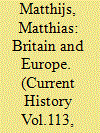

|
|
|
|
|
| Publication |
2014.
|
| Summary/Abstract |
After a tumultuous professional marriage of just over 40 years, Britain and Europe are facing the possibility of divorce. In January 2013, Prime Minister David Cameron decided to celebrate Britain's 40th anniversary as a member of the European Union by pledging a fundamental renegotiation of his country's terms of membership. Cameron further promised to submit any renegotiated deal to a clear "in-or-out" referendum in 2017 on whether or not to leave the EU, assuming his own Conservative Party wins a majority in the next general election in May 2015. Egged on by his party's growing ranks of restive Euroskeptics and trying to fight off a challenge on his right flank from populist Nigel Farage's UK Independence Party (UKIP), Cameron rolled the dice. He hoped to settle once and for all the Europe question, which has so often cast a dark shadow over the political debate in Westminster and Whitehall. Renegotiating
|
|
|
|
|
|
|
|
|
|
|
|
|
|
|
|
| 2 |
ID:
129210
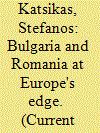

|
|
|
|
|
| Publication |
2014.
|
| Summary/Abstract |
Bulgaria and Romania joined the European Union as full member states on January 1, 2007. This momentous event was the culmination of a long and demanding political project that has often been described as "Europeanization." Although the foundations of this project were laid fairly soon after the fall of both countries' communist regimes in 1989, the pace was slow, and did not really gain momentum
until the end of the 1990s. Over the years the project ebbed and flowed, but what kept both nations committed was their strong belief that joining the EU would fill the political, economic, and security vacuum that the dissolution of the communist bloc had produced. EU membership was popularly seen as a panacea that would allow Bulgaria and Romania to stabilize their newborn democratic systems and overcome the economic problems of the postcommunist transition. It offered confirmation that the Bulgarians and Romanians were really Europeans. Seven years later, however, rather than feeling pulled into the heart of Europe, Bulgaria and Romania find themselves at the edge. Their EU partners raise questions about their commitment to the rule of law and their willingness to crack down on organized crime and illegal immigration. Does this mean that membership has not been an easy route to democratic stability, economic growth, and greater opportunity for all? European integration may be a difficult topic at a time when economic crisis has, for some, cast the entire effort into doubt. But the situation of Romania and Bulgaria lends itself to reflection on the wider project and its overall historical importance.
|
|
|
|
|
|
|
|
|
|
|
|
|
|
|
|
| 3 |
ID:
129209
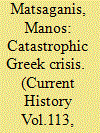

|
|
|
|
|
| Publication |
2014.
|
| Summary/Abstract |
Greece holds the rotating presidency of the European Union for the first half of 2014. As some commentators in Germany and elsewhere have been quick to note, there is surely something incongruous, if not outright absurd, in the spectacle of the most wayward member of Europe's family of nations setting the agenda (or pretending to), even for such a short time. For Greece is still in the throes of a terrible crisis. The experience of economic failure, nearbankruptcy, deep and protracted recession, a sudden fall in living standards, and bitter political conflict has dangerously raised the temperature of public debate. As if to prove the critics right, the Greek presidency got off to an inauspicious start, marked by a series of events ranging from the grotesque to the tragic. Former Transport Minister Michalis Liapis was caught driving without a licence and with counterfeit registration plates by traffic police too young to recognize him. It then transpired that his family home had been refurbished courtesy of Europe's taxpayers: EU "structural funds" earmarked for upgrading tourism infrastructure were diverted for his private use. Since the faction Liapis belonged to in the ruling conservative party was no longer influential, the prime minister's office declined to lift a finger to stop the wheels of justice, opting instead for a show of respect for judicial independence and the rule of law
|
|
|
|
|
|
|
|
|
|
|
|
|
|
|
|
| 4 |
ID:
129207
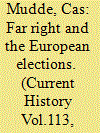

|
|
|
|
|
| Publication |
2014.
|
| Summary/Abstract |
If we are to believe the international media, this is going to be the year of the "far right anti-European populists." In the first three days of 2014, The New York Times published two opinion essays warning of the far right's rise, while The Economist focused its first issue of the year on "Europe's Tea Parties." Before this came months of public warnings of a "European populist backlash" issued by prominent European Union politicians, including the presidents of the EU, the European Commission, and the European Parliament (EP), and by national politicians, such as Italian Prime Minister Enrico Letta and Dutch Deputy Prime Minister Lodewijk Asscher. While the warnings have employed different terms and point to somewhat different groups
|
|
|
|
|
|
|
|
|
|
|
|
|
|
|
|
| 5 |
ID:
129208
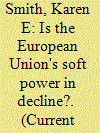

|
|
|
|
|
| Publication |
2014.
|
| Summary/Abstract |
Almost twenty-five years ago, the political scientist Joseph S. Nye Jr. coined the term "soft power" to capture the influence that the United States exercises not through coercion or inducement but through attraction. Coercion and inducement-the stick and the carrot-are forms of command power (or what Nye calls "hard power"), delivered via economic, diplomatic, or military instruments. Command power is used to compel or bribe others to do what you want them to do. Soft power, in contrast, is less a policy instrument to be wielded than an indirect force; it emanates from the attractiveness of a state's culture, political values, and foreign policies. Soft power encourages other international actors to cooperate with a state (or a multistate organization like the European Union) to pursue what they perceive as shared goals and values. It is therefore a less costly means of attaining desired outcomes than the use of command power.
|
|
|
|
|
|
|
|
|
|
|
|
|
|
|
|
| 6 |
ID:
129211
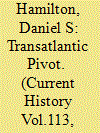

|
|
|
|
|
| Publication |
2014.
|
| Summary/Abstract |
A quarter century after the fall of the Berlin Wall, relations between the United States and Europe have evolved from a single-minded focus on stabilizing the European continent into more diffuse security, economic, and diplomatic agendas encompassing three broad elements. The first is ensuring the continued
vitality of the transatlantic alliance while taming the turbulent spaces of wider Europe. The second is guaranteeing mutual economic recovery while harnessing deep integration to create jobs and fuel growth, and also repositioning Europe and the United States for a world of emerging economies. The third is addressing a range of regional and global challenges, from energy security and nonproliferation to Middle Eastern turmoil and uncertain Asian dynamics.
|
|
|
|
|
|
|
|
|
|
|
|
|
|
|
|
|
|
|
|
|